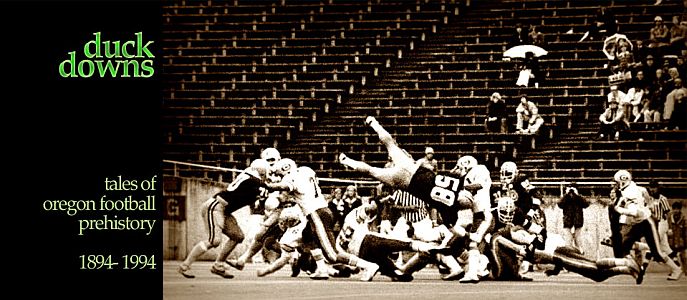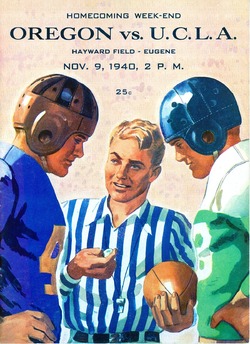This post is about Game Zero.
But the first game played involving Oregon students is said to have taken place years earlier, sometime between 1888 and 1892, on a meadow north of Skinner’s Butte. It was described in the October 1929 issue of Old Oregon by one of the participants, Frederic S. Dunn, class of 1892, and later a professor of literature at Oregon. The article is a tongue-in-cheek plea to have the game’s participants declared the first Oregon football lettermen, although the author can’t recall any other specific players in the game.
The plea, sadly, fell on deaf ears; but Dunn deserves an honorable mention for his colorful prose.
… For, be it known to you, my unknown confreres, the publicity now first accorded this story through the courtesy of OLD OREGON will clinch the claim we undoubtedly have to be recognized as the earliest wearers of the O . My own personal insistence upon this phase may in some measure account for the previous failure of the event to get into print. I have volunteered to repeat the story to several interviewers, who seem thereafter to have confused their notes with some of their mental-test quizzes . Their indifference toward this bit of archaeological information has been most regrettable…
Think of it, my hoped-for confederates. If we can put this over, when next Homecoming Day recurs, you and I can boldly walk down the cinder path, taking precedence even over Frank Matthews and Doc Keene in the march of the “immortals,” for our event antedates by several years that much chronicled so-called “first Football Game” in the mud.
These, then, are the generations of the first athletic contest ever participated in by students of the University of Oregon. Its recounting takes us back into times now almost impossible to visualize, when lonely Deady, the University’s only Hall, loomed up like a haunted Norman stronghold out of acres of wilderness. The present delightful maze of trees and shrubbery was not yet a transplanted probability. The vast Campus square was enclosed by a white-washed board fence, with one entrance; a style of four or five steps right at the end of Twelfth Avenue.
Like a moat on the outside of that fence was eocene mud, which, however, in season was of the proper consistency to foster about our only athletic possibilities; leapfrog, the broad jump and half hammond. (I never have known the origin of this latter word. To enlighten our modern gymnasts who may never have indulged in this primal sport, it was a “hop, step, and jump.”) The mud was awfully nice to measure one’s length in and you could toe your mark in it so much more legibly than in your modern sawdust.
Since the University provided no schedule of student activities such as now keep the campus in anticipation of coming attractions, about the only diversion we boys had, aside from playing Duck-on-the-Rock at street intersections, was to make a daily pilgrimage of afternoons to watch the south-bound Roseburg Express come in. There was an uninterrupted view of the track clear to Blair Crossing, and when, sometimes after weary minutes of delay – for not even then was the Southern Pacific always on time – we heard a far-away whistle and caught the first glimpse of the engine with its wide-flaring smoke-stack emerge from the woods and round the bend on its eastward swing into Eugene, there would be an almost concerted shout of “Here she comes.”
The mail-sacks would be dumped into a push-cart, trundled off down the street, and we boys would break up into desultory groups, to congregate again at what was then our Post Office, on the corner of Ninth and Willamette, where the First National Bank now stands. Here we would “pass the time of day” while waiting for the mail to be distributed and then would come the tedious falling-in-line for our turn at the window.
Meanwhile, somewhere in the later ’80s, there had arrived in town a new, up-to-date grocery firm, Smith and Hall, from New York State. The latter’s son is still a substantial business-man of Eugene. Carl Smith, the son of the former and now a distinguished Judge in Hawaii, was fresh from an eastern law school. His rather assertive and somewhat aquiline face was held in corresponding respect by us of still-primitive Oregon. And to us, late one afternoon, as we were gathered on the Post Office corner, came said Carl Smith and displayed to our wondering sight the first foot-ball of modern type most of us had seen. We had previously known only the spherical kind, something like the basket-ball of today, and such we used to kick about on vacant lots in a free-for-all knock out. But here now, in Carl’s arms, was the real thing, an ovate pig-skin foot-ball.
We were not long in deciding to adjourn to the space back of Skinners Butte, where there were no Municipal Auto Camp or Gravel Plant at that time — just a great open meadow between the river and the wood on the north slope of the hill. And here we nominated two captains who in turn selected their men, naming them alternately in the good old choose-up style. How in kingdom come I got in on the deal, I do not know, for I was a thinnish sort of chap and never considered much of a husky. But, would you believe it, I was booked as quarter-back, and told off to guard the east goal, down toward the river-bridge. I had no idea what my title meant – in fact, as I walked away from the bunch, I was inclined to interpret it as a sort of slight. There were “fullbacks,” and “half-backs,” and here I was a yet smaller fraction. And goal? I saw nothing of that semblance. And so, while they were still discussing, I sat down on a moss-covered rock and waited for developments. Anyway, I was prepared to make a great kick if that ball ever came my way. There never entered my head the possibility of a punt which I might gather in. I most certainly would have kicked and very probably would have waited for the ball to bound before essaying that kick.
What were the other fellows doing up there in the middle of the field? It was the funniest foot-ball game I had ever seen. Every time the ball was put in play, there would be a long pause, to find out what next to do. Both teams would all gather round Carl Smith and he would expound the law to them out of his manual of rules. And from where I sat on my lichened rock, I could hear much dispute and often loud words. The warm afternoon sped on. Nothing happened to distract my attention. The discussing became a sort of monotonous drone to me. I felt drowsy and nearly tumbled off my rock. So I played mumbley-peg for a while.
Finally, as it was nearing supper-time, I shouted that “if they were not going to give me a chance at that ball, I was going home.” So, off I meandered down Pearl Street. If a touch-down was afterwards made through my having abandoned my post, I do not know. I never even inquired. And as Carl left for the east in a few days and took his precious pig-skin with him, nothing more about foot-ball was broached. I graduated in June of 1892 without any farther experimental knowledge of the game, and was quite unprepared for the shock i met with at Harvard in the fall of that same year, where foot-ball was the Tsar of sports and the games with Yale and Princeton and Pennsy were climacteric occasions.
I am confounded by my own failure to recall a single other participant in that scrimmage behind the Butte. Judge Potter was probably not there. He was not athletically inclined, if I remember his student days and, besides, he was wearing a silky beard which fell almost to his waistline. Ed Orton may have been in the fray. He was be-whiskered too, but i do not think he would have counted it an alibi. Darwin Yoran, our Hon. ex-Mayor and now our Hon. Postmaster, could have been there. His long legs were admirably adapted to end runs. And Clyde Patterson – were you there, Clyde? So long absent from Eugene, but lately returned to the scene of your former escapades: maker of skiffs to ply our stumpful Mill Race, rider of a bicycle whose front wheel had the hub-spokes, felloes, and tire of a farmer’s truck-wagon, such that, when you started down Eleventh Avenue on the loose board walks, we knew it was you and not a typhoon – into all sorts of scrapes and out just as soon – you surely could not have missed that game back of Skinner’s. And Herbert Condon, now indispensable Comptroller of the University of Washington, owner of a similar wheel but painted a different hue – were you delivering Morning Oregonians that afternoon on your real flesh-and-blond pony – the pony on whose back you used to stand when lighting our old-fashioned kerosene streetlamps – or did you yield to temptation and ditch your bundle of papers under a sidewalk until you had played the game?
Well, this is much like speaking through a microphone. I hope someone will hear my appeal. So, boys, now all together! – WE WANT OUR O.
— excerpted from “And Here’s Another One”, Old Oregon v11-7, April 1929. Public domain.

 benzduck
benzduck